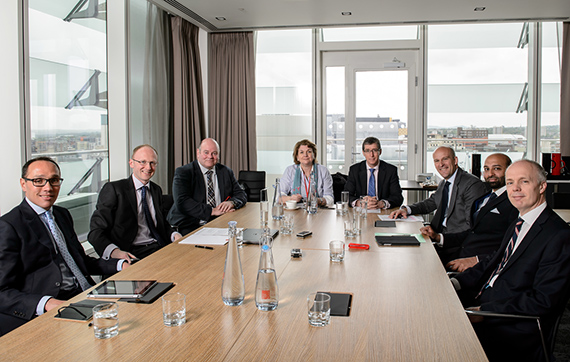
Is regeneration at the top of the agenda for the new government? EG went to Birmingham, energised by the impending arrival of HS2 and major corporates such as HSBC, to find out.
At the Estates Gazette Peter Wilson Lecture earlier this year, Lord Michael Heseltine described leadership, co-operation and competition as the foundation principles of revitalising cities. Shortly after, in that London bastion of urban regeneration, Battersea Power Station, leading voices echoed his call for long-term thinking from public and private investors. The third event in EG’s regeneration series heard key players with widespread regeneration interests welcome a continued focus on urban renewal and localism.
The experts exchanged thoughts at the office of Wragge Lawrence Graham & Co at Two Snowhill, the building itself part of a vast expanse of regeneration activity. At the same time, Lord Heseltine, the chancellor and the communities secretary were also in town to formally announce a Midlands combined authority. It was co-operation in motion and testament to the region’s role in the economic development of the country.
Devolution
At the round table, however, it was devolution that was on everyone’s lips. A “solid framework within which the market can get busy and deliver”, said Barry Allen, head of Birmingham office at Savills.
Waheed Nazir, director of planning and regeneration at Birmingham city council, said the decision that day by Solihull, Birmingham, Coventry and the four Black Country councils to press ahead with creating a combined authority had paved the way for the authority to “take a more strategic approach to housing and development”. He added that it was time for regions to take control of their own destinies.
Movements in central government would make it easier for the model to be replicated elsewhere in the country, according to Jackie Sadek, who had served as an adviser to then cities minister, now communities secretary Greg Clark. She described Clark as a “champion of devolution”.
Mayors
The idea of metropolitan mayors was less well received. Eamonn Boylan, chief executive of Stockport metropolitan borough council, said he had failed to see wholesale support for the model. Consensus instead focused on the leadership a mayor could provide.
Sadek said: “There is a perception that when places have a champion, somebody who can hit the table, get things moving, that city will
do better.”
Rob Groves, senior project director at Argent, agreed, saying: “Inevitably private sector-public sector development will involve decisions where you need the right person in place who can say ‘this feels like the right thing to do’. ”
Partnerships
A city and a mayor’s most important characteristic is a willingness to work with the private sector and take a long-term view on investment, the experts agreed.
A failure to do this so far had created a “market failure situation”, said Michael Auger, regional director of Muse Developments, where authorities would not fund the beginning of a scheme. “There has to be an understanding that the private sector can do only so much in the earlier phases and in a lot of locations that might surprise people.”
But there was a pervasive optimism that councils were beginning to recognise the importance of partnerships and taking a long-term view.
Richard Beckingsale of Wragge Lawrence Graham & Co said: “It is the authorities that can package up the opportunities that will be a 10-year programme of work. Some of their ideas, such as clustering of sites, long-term partnerships and commitment to delivery are a vital improvement.”
Council funding
There was strength of feeling over the issue of council resources. Boylan said: “Local governments are sitting in one of the increasingly few areas of government spending that isn’t ring-fenced or protected, and it’s quite a challenging place to be.”
Sadek suggested the issue could incentivise partnerships, and Beckingsale called for better decisions.
“The real issue is exercising the judgement to use public money in the right places,” he said. “What we should not be doing is trying to make the fundamentally non-viable deliverable. We have got to make fundable those things that are inherently commercial.”
But there was a call to look beyond a return on investment and discern the social and environmental benefits of development.
Nazir said: “When we look at regeneration we should not be intervening just to get the cash flow working and the scheme to be viable. We need to look at the social and economic values and impact those schemes have on communities.”
To listen to the debate in full and see more photos, click here.










